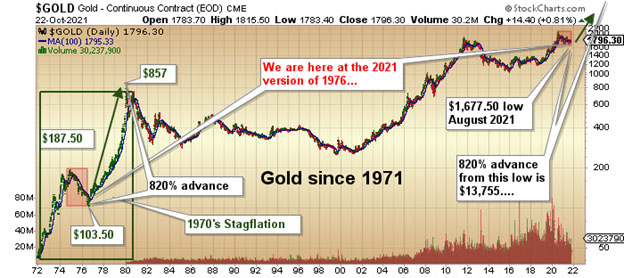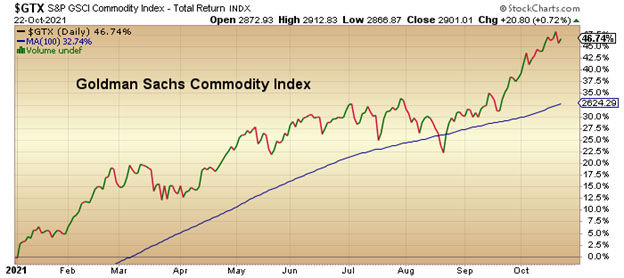The History of Gold’s Pavlovian Narrative
Commodities / Gold and Silver 2021 Oct 29, 2021 - 04:27 PM GMTBy: The_Gold_Report
Precious metals expert Michael Ballanger delves into the Federal Reserve's actions going back decades that affect the price of gold.
One of the benefits (or luxuries) of being removed from the commuting rat-race of my earlier life is the ability to devote large swaths of free time to reading – to the acquisition of either new sources of knowledge or new frameworks of opinion, neither of which can be trusted but both of which may be useful.

I use as a case-in-point the monotonous, ongoing obsession held by both politicians and the media over the pandemic, where theory after theory of its origin, prevention and containment have been trotted out with little or no focus on its treatment other than hospitalization. Also high on the list of deviant narratives is the cleverly scripted, media-sanitized assumption that inflation, which started out as being “transitory” six months ago, is now being redefined as “good for the economy.” The arrival of inflation, it should be noted, is a great deal akin to Hemingway’s definition of the arrival of bankruptcy brilliantly coined in his 1926 novel “The Sun Also Rises.”
Bill: “How did you go bankrupt?”
Mike: “Two ways – gradually, then suddenly.”
I would proffer that the Western world is currently in the “gradually” phase of sovereign bankruptcy while the financial media (and central banks) are practicing the fine art of denial and the not-so-fine art of prevarication in their last-ditch act of desperation to maintain any semblance of credibility in the global financial marketplace. I find it completely laughable that any rational thinker could tomorrow come out of a grocery store singing praises for the wonderment of both the fiscal and monetary profligacy that created one’s “prices paid.”
Why, one look at the Goldman Sachs Commodity Index and the poor grocery buyer would be out to the toolshed in search of torches and pitchforks covered with layer after layer of dust dating back to 1970s. In fact, citizens are currently behaving much like they did during the bulk of the Arthur Burns era (Fed Chair 1970-1978); complacency rules the day only because their houses and their 401K stock portfolios are grazing the lower bounds of ozone layer valuation levels. Once that disappears, the behavior of the “ruled classes” will transition to outrage and it is then, and only then, that current attitudes toward gold will reverse.

“It was probably a mistake to allow gold to rise so high.” “When people begin anticipating inflation, it doesn't do you any good anymore, because any benefit of inflation comes from the fact that you do better than you thought you were going to do.” (Paul Volcker, Fed Chairman 1979-1987)
It was during Volcker’s first year in office as Fed chair in 1979 that he witnessed the final parabolic move in gold prices, which many viewed as the ultimate manifestation not of consumer prices but rather of inflationary expectations – a bogeyman far more feared by bankers and politicians than actual bumps in the CPI [consumer price index], and it explains a great deal.
As a gold investor, it was one sentence uttered by Chairman Volcker that set the stage for the explanation of the behavior of gold in recent decades. The politicians and the central bankers read that one sentence – “It was probably a mistake to allow gold to rise so high.” – and then assign blame for the 15% Fed Funds rate, record post-1930’s bankruptcies and stock market declines on gold rather than Volcker’s strangulation of the availability (supply) of bank credit, which allowed the cost (or price) of credit (interest rates) to respond to the demand for credit, sending borrowing costs into orbit around Jupiter.
What followed the 1981-1982 recession was a credit-fueled expansion of incredible magnitude, lasting for eighteen years and which ushered in globalization, the internet, and record stock prices. Gathering steam with only minor disruptions in 2001, 2007, and 2020, the ascent of the canonization of the central banker followed a parallel course with the level of the S&P 500. Sadly, it was the playbook of Paul Volcker that played an integral role in establishing policy toward gold: if you contain gold prices, you contain inflationary expectations. This is why the generations of new investors have decided to either stay committed to the status quo of “The Fed’s got our backs” or completely abandon the fiat currency regime of their baby-boomer parents or grandparents in favor of high-flying stocks or crypto. They have seen these canine investors respond time after time after time to the chiming of the central bank bell as the price of gold gets washed away in a stream of malevolent, narrative-driven saliva.
Central bankers and Wall Street have happily supported this Pavlovian exercise in Orwellian thought control with no better example than last Friday when Jerome Powell, seeing gold breaking out of its triangular restraints above $1,800, uttered the fateful words “It is time to taper” sending the algorithms berserk and on a bid-smashing rampage that eliminated all but a few pennies of profit after what appeared to be an important breakout. However, it comes as no surprise to this writer because I have opined for years that only in the gold and silver markets do you ignore the time-tested tenets of technical analysis and “Sell breakout/Buy breakdowns” and the reason is simple: Those markets are rigged.
The blatancy in Friday’s actions reeks of desperation because Chairman Powell, desperate in his seeking a second term, is now back on his heels and reeling under the assault of the left-wing Elizabeth Warren who is out for the scalps of Powell and his Fed governor henchmen after the revelation of “unnecessary” trading in assets deemed “friendly” to the Fed balance sheet. Just as an onion changes its appearance as one pulls back each consecutive layer of skin, the true agenda of the central bank member is also changing but more importantly, the adulation of the people at the Federal Reserve is now taking on the appearance of Hemingway’s bankruptcy analogy:
Millennial Trader: “How did the Federal Reserve finally lose all credibility?”
Former Fed Governor: “Two ways – gradually, then suddenly.”
And remember that since The Sun Also Rises, so too shall gold and silver…
Follow Michael Ballanger on Twitter @MiningJunkie. He is the Editor and Publisher of The GGM Advisory Service and can be contacted at miningjunkie216@outlook.com for subscription information.
Originally trained during the inflationary 1970s, Michael Ballanger is a graduate of Saint Louis University where he earned a Bachelor of Science in finance and a Bachelor of Art in marketing before completing post-graduate work at the Wharton School of Finance. With more than 30 years of experience as a junior mining and exploration specialist, as well as a solid background in corporate finance, Ballanger's adherence to the concept of "Hard Assets" allows him to focus the practice on selecting opportunities in the global resource sector with emphasis on the precious metals exploration and development sector. Ballanger takes great pleasure in visiting mineral properties around the globe in the never-ending hunt for early-stage opportunities.
Disclosure: 1) Statements and opinions expressed are the opinions of Michael Ballanger and not of Streetwise Reports or its officers. Michael Ballanger is wholly responsible for the validity of the statements. Streetwise Reports was not involved in any aspect of the article preparation. Michael Ballanger was not paid by Streetwise Reports LLC for this article. Streetwise Reports was not paid by the author to publish or syndicate this article. 2) This article does not constitute investment advice. Each reader is encouraged to consult with his or her individual financial professional and any action a reader takes as a result of information presented here is his or her own responsibility. By opening this page, each reader accepts and agrees to Streetwise Reports' terms of use and full legal disclaimer. This article is not a solicitation for investment. Streetwise Reports does not render general or specific investment advice and the information on Streetwise Reports should not be considered a recommendation to buy or sell any security. Streetwise Reports does not endorse or recommend the business, products, services or securities of any company mentioned on Streetwise Reports. 3) From time to time, Streetwise Reports LLC and its directors, officers, employees or members of their families, as well as persons interviewed for articles and interviews on the site, may have a long or short position in securities mentioned. Directors, officers, employees or members of their immediate families are prohibited from making purchases and/or sales of those securities in the open market or otherwise from the time of the interview or the decision to write an article until three business days after the publication of the interview or article. The foregoing prohibition does not apply to articles that in substance only restate previously published company releases.
Charts provided by the author.
Michael Ballanger Disclaimer: This letter makes no guarantee or warranty on the accuracy or completeness of the data provided. Nothing contained herein is intended or shall be deemed to be investment advice, implied or otherwise. This letter represents my views and replicates trades that I am making but nothing more than that. Always consult your registered advisor to assist you with your investments. I accept no liability for any loss arising from the use of the data contained on this letter. Options and junior mining stocks contain a high level of risk that may result in the loss of part or all invested capital and therefore are suitable for experienced and professional investors and traders only. One should be familiar with the risks involved in junior mining and options trading and we recommend consulting a financial adviser if you feel you do not understand the risks involved.
© 2005-2022 http://www.MarketOracle.co.uk - The Market Oracle is a FREE Daily Financial Markets Analysis & Forecasting online publication.



